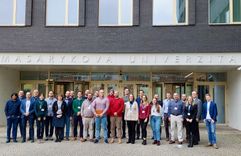“Both South Moravia and Estonia have a strong ICT foundation with slightly different foci, so the collaboration will help us learn from each other, and hence, improve our digital societies.”
Research team of the CHESS project // Photo credit: University of Tartu
The Cybersecurity Excellence Hub in Estonia and South Moravia (CHESS), which was selected from 102 applications, aims to bridge the gap between research and innovation by bringing together fundamental researchers with economic and societal exploiters.
In this EU-funded project, Estonia, a world leader in digital society with a robust e-government infrastructure, will collaborate closely with South Moravia, a Czech powerhouse in ICT industry and education with a strong focus on cybersecurity.
The CHESS project will develop a joint cross-border cyber-security research and innovation strategy, concentrating on six challenge areas:
- internet of secure things;
- security certification;
- verification of trustworthy software;
- security preservation in blockchain;
- post-quantum cryptography; and
- human-centric aspects of cybersecurity.
“The strategy development will be aided by the implementation of pilot projects that will reinforce the cross-regional collaboration, engage regional innovation ecosystems and build evidence for future projects,” said Prof. Vashek Matyas of Masaryk University.
Cybernetica’s senior researchers will be responsible for leading the post quantum challenge area and co-leading the security certification challenge area. Liina Kamm, Cybernetica’s principal investigator for the CHESS project said: “Both South Moravia and Estonia have a strong ICT foundation with slightly different foci, so the collaboration will help us learn from each other, and hence, improve our digital societies.”
Training and knowledge transfer will eliminate gaps in skills and expertise in the regions. Dedicated task forces will ensure CHESS's sustainability by integrating it with regional, national, and European Union-level strategies and funding programmes. "To exploit the project outputs, especially the pilot project results, CHESS will link researchers and innovators with entrepreneurship training and business consultancy services available in Estonia and South Moravia", explained Prof. Raimundas Matulevičius of the University of Tartu.
Ultimately, the CHESS project will have a beneficial impact on the participating institutions by increasing their visibility, attractiveness, and potential to generate innovative and usable research results. But in addition, it will create a unique network of interactions beyond its consortium, connecting South Moravia's strengths in certification and human-centric research with Estonia's expertise in blockchain, post-quantum cryptography, and e-government to facilitate a secure transition to full-scale digital societies.
The CHESS consortium comprises nine partners and three associated partners, including Masaryk University, the University of Tartu, Brno University of Technology, Tallinn University of Technology, Cybernetica, Red Hat, Guardtime, the Estonian Information System Authority, the CyberSecurity Hub, the National Cyber and Information Security Agency, the South Moravian Innovation Centre, and the Estonian Information Security Association.
The project is funded by the European Union under Grant Agreement No. 101087529. The views and opinions expressed in this project are solely those of the author(s) and do not necessarily reflect those of the European Union or European Research Executive Agency.
